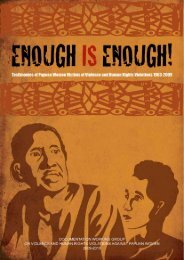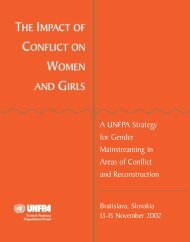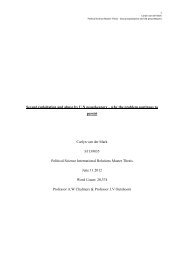Download the full report - Human Rights Watch
Download the full report - Human Rights Watch
Download the full report - Human Rights Watch
Create successful ePaper yourself
Turn your PDF publications into a flip-book with our unique Google optimized e-Paper software.
It is possible to identify specific problems that contribute to deep-seated impunity for<br />
torture in Sri Lanka, including that prosecutorial and judicial staff responsible for<br />
collecting and processing evidence lack adequate training, resources, and gender<br />
sensitivity, that repeatedly transferring cases without informing petitioners denies<br />
witnesses a chance to attend judicial hearings, and an absence of witness protection<br />
mechanism deters witnesses from coming forward. Legal guarantees meant to protect due<br />
process and ensure a speedy trial have been eroded by more than three decades of<br />
reliance on emergency regulations and provisions of <strong>the</strong> PTA. Even after <strong>the</strong> Emergency<br />
Regulations were withdrawn in September 2011, <strong>the</strong> PTA, with similarly broad powers,<br />
remained in force. Directives issued by <strong>the</strong> president in July 2006 to reduce <strong>the</strong> likelihood<br />
of torture and ill-treatment have largely been ignored. 99<br />
However, <strong>the</strong>se specific barriers to prosecutions and redress pale in comparison to <strong>the</strong><br />
larger and more intractable issue: <strong>the</strong> Sri Lankan government’s clear unwillingness to<br />
seriously investigate or prosecute serious violations of human rights by <strong>the</strong> military and<br />
police, particularly those committed in connection with <strong>the</strong> armed conflict against <strong>the</strong> LTTE.<br />
Despite a backlog of cases of torture, enforced disappearance, and unlawful killings going<br />
back two decades, <strong>the</strong>re have been only a small number of prosecutions. Past efforts to<br />
address violations by creating ad hoc mechanisms have produced few results, whe<strong>the</strong>r in<br />
providing information or prompting prosecutions.<br />
99<br />
On July 7, 2006, <strong>the</strong> president and Commander-in-Chief of <strong>the</strong> Armed Forces and <strong>the</strong> Minister of Defense<br />
issued Directives to <strong>the</strong> Heads of <strong>the</strong> Armed Forces and <strong>the</strong> Police Force stating that, “any officer who makes an<br />
arrest or order of detention must, according to <strong>the</strong> above Directives, within 48 hours from <strong>the</strong> time of arrest or<br />
detention, inform <strong>the</strong> HRC [<strong>Human</strong> <strong>Rights</strong> Commission] of such arrest or detention and <strong>the</strong> place of custody or<br />
detention.”<br />
“WE WILL TEACH YOU A LESSON” 46




![IANSA [PDF, 2MB] - PeaceWomen](https://img.yumpu.com/25206379/1/190x123/iansa-pdf-2mb-peacewomen.jpg?quality=85)
![Commitments Sample [PDF, 93KB] - PeaceWomen](https://img.yumpu.com/25206331/1/190x245/commitments-sample-pdf-93kb-peacewomen.jpg?quality=85)










![A Toolkit for Advocacy and Action [PDF, 260KB] - Peace Women](https://img.yumpu.com/25205989/1/190x245/a-toolkit-for-advocacy-and-action-pdf-260kb-peace-women.jpg?quality=85)